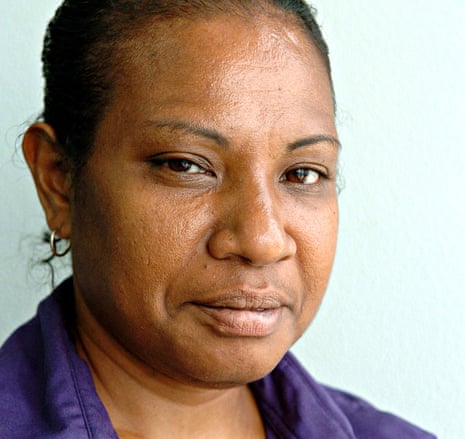The death of a high-profile Papua New Guinean journalist at the age of 41 has sparked a national debate about the country’s continuing epidemic of violence against women, after graphic photographs were shown at her funeral.
Family members of Rosalyn Albaniel Evara, who was an editor at PNG’s largest newspaper, have received support from the Port Moresby governor for their calls for a police investigation into her death.
Evara died last week after she collapsed at her Port Moresby home, and was rushed to hospital. The Post-Courier journalist was farewelled at a funeral in Port Moresby on Monday, where an aunt, Mary Albaniel, used her eulogy to allege Evara had been violently assaulted.
Albaniel, wearing a “say no to violence” T-shirt, showed photographs of her battered body and alleged a history of abuse.
“When I heard that you died, I regretted that I should have done more than just talk to you, but how?” said Albaniel.
She said they discovered the bruises when preparing Evara’s body, and decided to take photos in the hope it may lead to criminal prosecution.
Albaniel told the Guardian she felt compelled to raise the allegations at the funeral, which was attended by Evara’s husband.
“I’m using the same surname as the deceased’s maiden name. To continue advocating in my job as a defender of human rights would be useless if I can’t get justice done,” she said.
“I strongly advocate against all forms of violence against women. That’s why I decided to wear my job cap yesterday.”
On Tuesday morning the Port Moresby governor, Powes Parkop, reportedly ordered the woman’s burial be deferred for a postmortem and investigation, overriding the initial wishes of Evara’s mother, who later that day decided to formally request a postmortem.
Parkop has spoken out against gender-based violence in the past, and Albaniel is a human rights and anti-violence against women campaigner.
“It’s not only in PNG. I know from my job [the attention on Evara’s death] will make a big difference, and a big step forward [in addressing gender-based violence]. Because women don’t get the full support from the men, even their own husbands and brothers,” she said.
“Men don’t understand what it means to allow justice to prevail. There is a lot of fear. I told her family and I tell the public that I am advocating against it.”
Papua New Guinea is considered to be one of the worst places in the world for violence against women and girls. Earlier this year Human Rights Watch reported little had changed, despite public promises of reform by the government.
Human Rights Watch said police and prosecutors rarely prosecuted cases against perpetrators of family violence, and the government was still yet to act on family protection legislation passed in 2013.
Evara is survived by a daughter. According to reports, two of her children had died in the past two years.
The allegations raised at Evara’s funeral received national media attention, albeit little from her former workplace.
A former editor of the Post-Courier, Alexander Rheeney, accused the paper of failing in its duty of care and failing to seek justice for Evara. He said the Post-Courier, which is owned by News Corp, belittled her death by running a story on page 16, compared with the front-page treatment given by rival paper, the National.
“Your [gender-based violence] campaigns are worthless if you cannot effect change and become champions of change by starting in your own backyard,” Rheeney said.
The Boroko police commander, Titus Bayagau, confirmed to the Guardian there was now a police investigation.
Todagia Kelola, an editor at the Post-Courier, defended the news coverage of Evara’s death.
Kelola said he had been closely involved with the family, assisting with the funeral and other arrangements, as well as mourning the loss of a colleague. He said her death had come as a shock, and he had urged the family to have a postmortem done but respected their initial wishes.
He said the paper couldn’t report the allegations raised as they were unsubstantiated without a postmortem.
“Because there was no postmortem carried out, how can I say it was a GBV case?” he said.
Asked why he had not run a front-page report like the National, Kelola said he had wanted a report to focus on Evara.
“It really hurt me because I know if I was on the outside, the story by the National was telling a really good angle. But I was more concerned to bring out the life of Rosalyn when she had arrived in the Post-Courier, and as a journalist in PNG.”
He said he was glad the family had changed their minds and was requesting a full investigation.
“I can assure you that if it’s what has been stated we will aggressively go with it. When she was alive she never told us,” he said.
In an unbylined statement, the Post-Courier rejected a “tirade of accusations” which it said “sarcastically berated and belittled Post-Courier as a leading advocator against GBV and allegedly doing nothing to stop the treatment of a passed colleague from being one such victim”.
“We have never deviated at any one time in our stated commitment as a publishing entity to be included in the fight against gender-based violence,” it said.
“Through our factual reports and news stories, law enforcement agencies and taskforces have seriously reacted and responded to many specific and referred cases we have highlighted. And indeed there have been measurable successes for many of the victims of GBV, their families, parents and siblings.”
